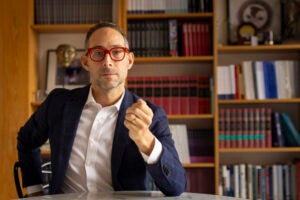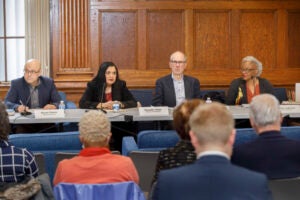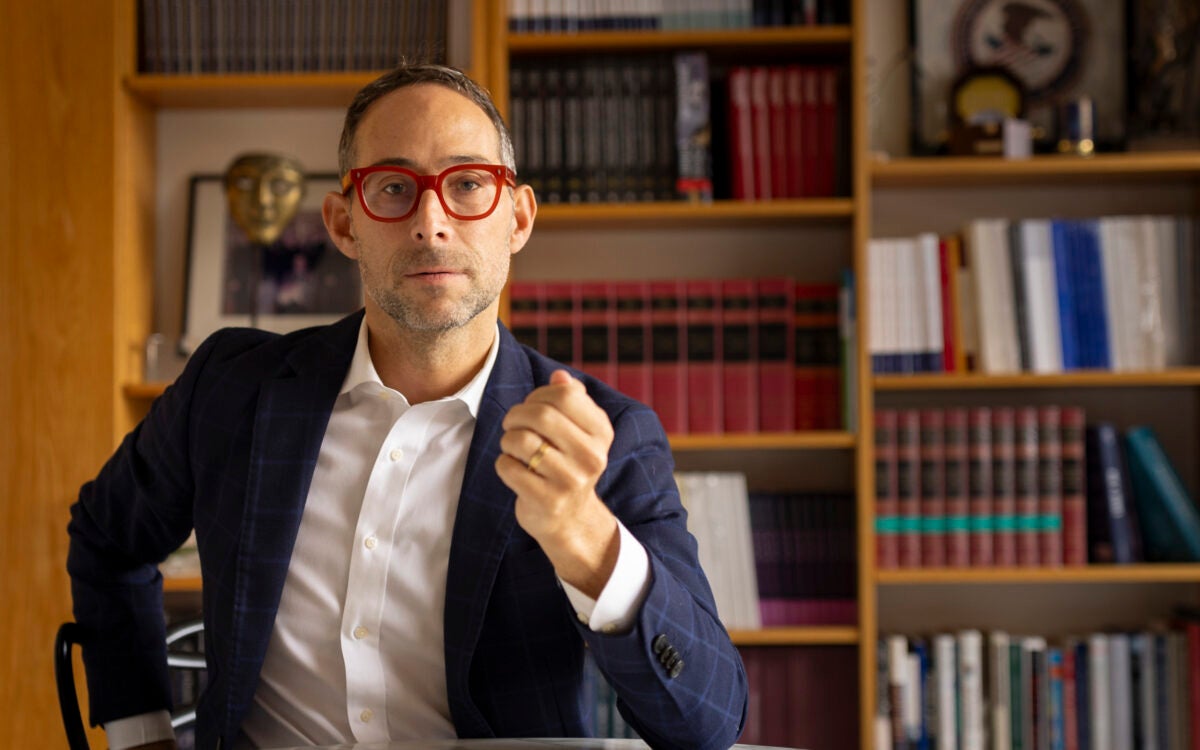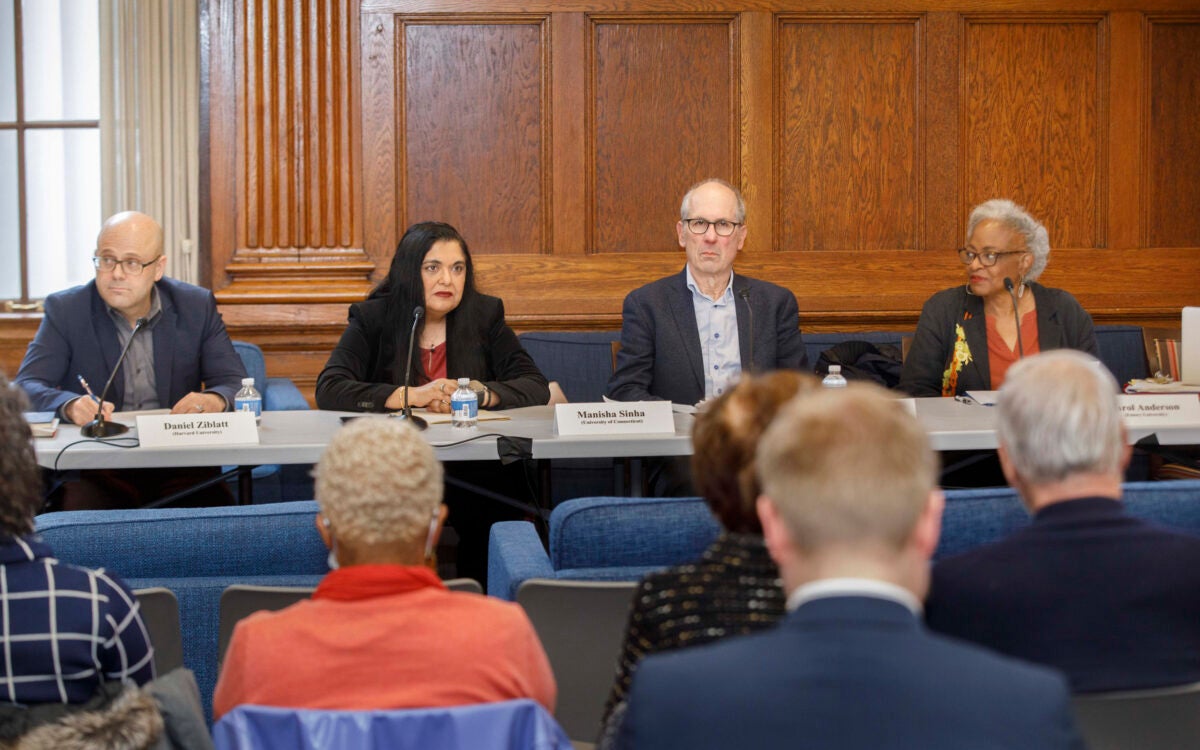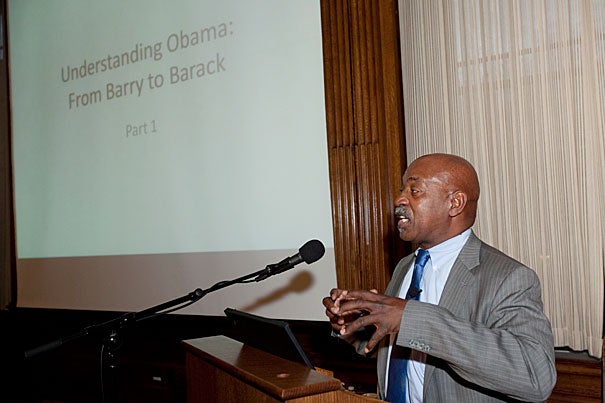
Obama’s sense of racial identity came largely from his mother. “She was instrumental in telling him who he was,” Charles Ogletree Jr. told his audience during the first of a three-part lecture series titled “Understanding Obama.”
Jon Chase/Harvard Staff Photographer
Obama’s narrative
Ogletree offers close read of the president in lecture series
Mixing historical perspective, personal reminiscence, and psychological analysis, Harvard Law School Professor Charles J. Ogletree Jr. kicked off a three-part lecture series titled “Understanding Obama” Tuesday at the Barker Center and sponsored by the W.E.B. Du Bois Institute for African and African American Research.
“Barack Obama is a brilliant man — a really brilliant man — and sometimes that gets in the way of politics,” said Ogletree, the Jesse Climenko Professor of Law and director of the Charles Hamilton Houston Institute for Race and Justice.
In Tuesday’s talk, “From Barry to Barack,” Ogletree focused on Obama’s childhood, schooling, and early career, tracing the role race and religion played in forming his character.
Ogletree covered what has become common knowledge about Obama’s upbringing, infusing the facts with fresh insight. The future president was born in Hawaii to a white American mother and a Kenyan father. “In each stage of his life, trying to understand race has become increasingly difficult,” Ogletree said.
Obama’s sense of racial identity came largely from his mother. “She was instrumental in telling him who he was,” Ogletree said. She told her son about his father’s struggles to improve his life; she brought home books on the civil rights movement. His father, whom Barack met only once, gave him his name, but called himself “Barry,” as did young Obama until high school age. Ogletree showed a slide of the poignant inscription “King Obama,” drawn decades ago in a schoolyard’s wet cement by a youngster grappling with an absent father.
Ogletree described how Barry, now Barack, searched for a religious community in Chicago and found a connection in the church of the Rev. Jeremiah Wright. There he was brought to tears by a sermon on “The Audacity to Hope.” Obama changed the phrase for his book, “The Audacity of Hope.”
Ogletree, who knew both Obama and his wife, Michelle Obama, when they studied at Harvard, emphasized that Barack was an excellent student but had to be “pushed and pulled” to run for president of the Harvard Law Review.
“He was not always highly regarded by people when he was president,” Ogletree said. “He believed then as I think he believes now that he can bring everybody together. And is that a benefit or is that a challenge in some respects? He allowed people of every political perspective to be editors on the law review and write what they wanted to write about. And some of the most conservative people respected him because he was smart and he had the judgment to say that what they wrote would be accepted because it was well-written even if he disagreed with it. He was deeply committed to bringing folks together.”
Ogletree played a video of a 1990 rally for Harvard Law Professor Derrick Bell, who announced he was taking an unpaid leave of absence to push the Law School for more diversity. The image was blurry and jumpy, but the voice of the young man who introduced Bell was unmistakably that of the future president. “Of course, we hid this during the 2008 campaign; I don’t care if they find it now,” Ogletree said.
A more significant development came after Obama graduated Harvard in 1991. He could have been a clerk for the Supreme Court; he could have easily gone to a big law firm with a big salary. He and Ogletree even talked about the options, and Obama said he wanted to go back to Chicago to be a community organizer.
“I thought about it and I said, ‘Barack, yes, you can,’ ” Ogletree said amid huge laughter. He added, to an even bigger laugh, “Barack has never given me credit at all.”
So Obama went back to Chicago, and eventually won a Senate seat. In 2004 in Boston, he gave a career-defining speech at the Democratic Convention, again sounding the theme of bringing people together. “It really was to be a defining speech about who was Barack Obama,” Ogletree said.
Audience members, however, questioned the effectiveness of the president’s efforts to unite people, and Ogletree acknowledged: “When you think about the stimulus package, health care, the jobs bill, there is something remarkable about watching other presidents do what they thought was right, even against congressional reaction, to put it in their face to get something done.”
He predicted, however, that the Supreme Court will uphold most of Obama’s health care plan and that the term “Obamacare” will become a positive not a pejorative description.
Asked, “What keeps him together? What is his core?” — or as Henry Louis Gates Jr., Alphonse Fletcher University Professor, interjected, “What makes the brother tick?”— Ogletree cited Obama’s efforts every night in the White House to eat dinner with his family and to read about 20 of the thousands of letters he receives. “He is still really learning how to be a great president,” Ogletree said.
The second and third lectures in the series —“The Emergence of Race” and “The Conundrum of Race” — are scheduled for 4 to 5:30 p.m. today and Thursday at the Thompson Room, Barker Center, and are open to the public.

